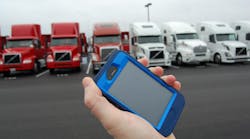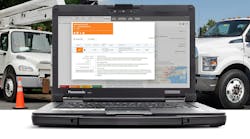The ongoing debate within the trucking industry regarding whether to rely on “Bring Your Own Device” or “BYOD” mobile communication platform or more traditional “Company-Owned Personally Enabled” or “COPE” devices, especially in terms of security, privacy, cost and supportability issues, isn’t going away anytime soon – with plenty of argument evident for and against both technological strategies.
“This is a red-hot topic being driven by the onslaught of smart communication devices, and it can be quite confusing,” Brian McLaughlin, president of technology provider PeopleNet, explained to Fleet Owner in an article last month.
Yet some industry suppliers feel the debate should not necessarily center on which technology platform is better or worse for motor carriers; rather, it should focus on what works best on a company-by-company basis.
"It’s not necessarily about what is better, because both offer benefits. It simply depends on the enterprise and the operating environment,” Christian Schenk, senior VP-product and market strategy for XRS, told Fleet Owner.
“The value is not in which direction a company goes; rather, it’s the fact that there is a choice,” he explains. “It’s true that a corporate liable device model is more predictable, but it is another device in the cab. The truth is that all drivers already have devices and perform tasks on them for the benefit of the enterprise every day, whether that is calling a shipper, emailing dispatch, or using a navigation app to get to the consignee. It’s happening every day, in every industry.”
Schenck points out that while BYOD is an employee-owned device that will run corporate content – something many might view as a security risk – it’s already in wide use across many industries. “We all do this already,” he noted. “For example, do you run your corporate email on your latest iPhone of Samsung device? Yes. Do you store corporate files on a cloud sharing fileserver that you access from your personal device? Yes.”
The reality, said Schenk, is that BYOD is already here: it is not a trend but rather is a factor in everyone’s lives today.
“Thus, we don't think about it as an extra expense,” he stressed. “We consider it as a catalyst to efficiency and consolidation of user loyal technology, not an either/or proposition.”
Schenck pointed to a study conducted by the CITA – the wireless industry’s trade association – that indicated more than half (some 57%) of employees used their personal wireless devices for business purposes, regardless of their company’s information technology (IT) policy. On top of that, research from CTIA and the global consulting firm Gartner Group noted that transportation will be the largest contributor to BYOD usage over the next five years, with Gartner calling the use of BYOD an “inevitable requirement” for businesses in a 2012 report.
XRS’s Schenk said BYOD usage in trucking is so widespread because drivers are already using smart phones and tablets for personal use; to communicate with family and friends while they’re on the road, do their banking, etc.
“They’re already comfortable using their own devices versus … and companies want to avoid the high capital costs of providing devices, so using the driver’s device will address both preferences,” he noted. “The company gets its required compliance solution, but the driver gets to use a preferred device, perhaps with the company picking up part of the tab.”
That’s why Schenk believes the “BYOD vs. COPE” debate will really boil down to a matter of choice. “Companies don't have to pick one or the other; many of our clients leverage corporate liable devices for company trucks and BYOD for owner/operators,” he explained. “This gives companies the best of both worlds – if a driver leaves, their XRS logins are disabled and the driver no longer has access to corporate information. It’s that simple.”



